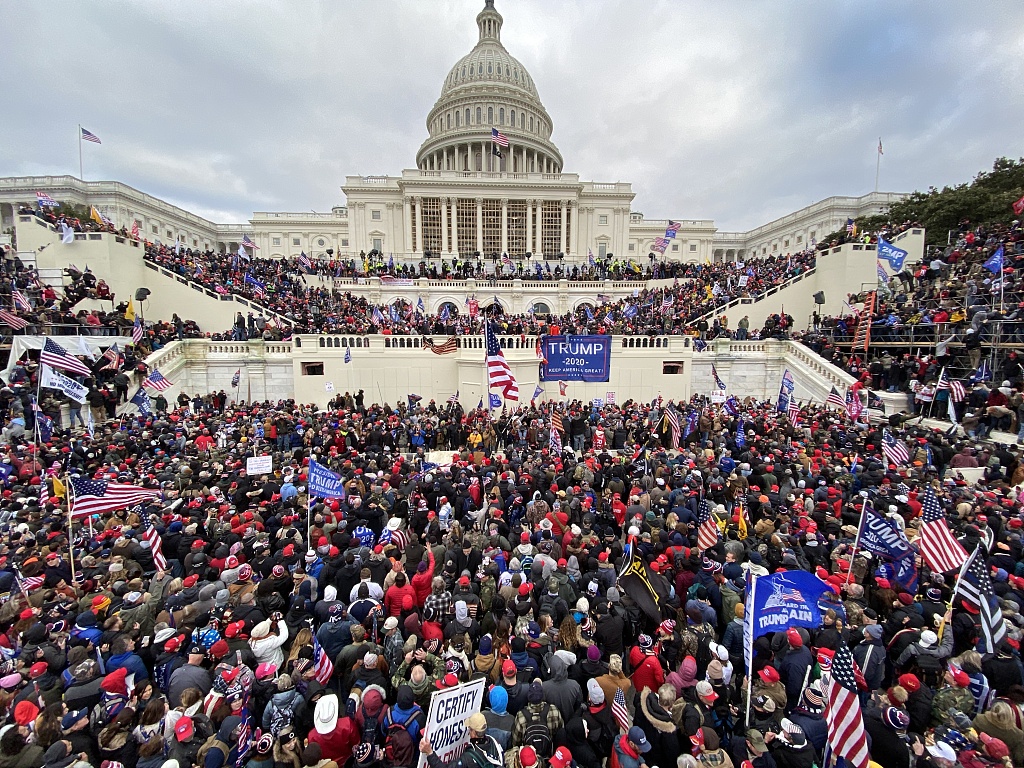Trump undermines US democracy
- By Mitchell Blatt
 0 Comment(s)
0 Comment(s) Print
Print E-mail China.org.cn, January 12, 2021
E-mail China.org.cn, January 12, 2021

On the day that the United States Congress was to certify the results of the presidential election that was already held two months ago, the losing candidate, Donald Trump, orchestrated a riot by his supporters who invaded the Capitol, smashed windows and trashed offices, forcing the legislators into lockdown.
Their behavior was violent and radical, but it was not shocking. Donald Trump has been inciting hatred and attacking the institutions of American governance for as long as he has been involved in politics.
During his 2016 run for office, Trump promised he would not accept the results of the election if he lost. To the misfortune of Americans, he ended up winning narrowly that year, thanks to the intricacies of America's electoral system, despite losing the popular vote. It was only a matter of time before the army of angry believers he had assembled acted on his words.
The problem runs deeper than the fact that a mass of violent rioters stormed the Capitol. Trump had been falsely railing against the election for months, even before the election was held, and his Republican Party supported him. The rioters were standing for the same values as the Republicans who voted against certifying the election. The only difference was in their social stature and their access to power. Even after the rioters had been removed, over 150 Republicans still voted to overturn the results of the already-decided election.
A democratic system rests on certain bedrock principles: The losing side must accept the results and leave office in an orderly manner, the public must have faith that elections are fair and legitimate, and voters must be informed and make their choices based on at least a semblance of reason.
Donald Trump and his Republican backers are waging war on each of these principles. They intentionally diminish trust in elections when they say the election was rigged just because Trump lost. Democrats, for their part, are becoming less confident in the legitimacy of elections when they see the extremes that Republicans are willing to go to hold on to power.
If voters believe unhinged conspiracy theories about rigged elections, or they think that rioting is justified, they are not fit to make informed choices, either.
As an opinion columnist, it is my job to offer up my honest assessment. That means I will state where the responsibility lies when one person or group of people is to blame. In this case, it is undeniable that the Republican Party is primarily to blame for the rioting that took place at the Capitol on Wednesday evening. They were the ones who called for agitators to mass in Washington. They were the ones who held the rally riling them up and told them to go to the Capitol to disrupt the election business. Never before in the past century has a presidential candidate orchestrated a riot in the Capitol.
I would be remiss not to state, however, that the liberal movement has resorted to some extreme actions of its own to destabilize American democracy over the past year. Liberal activists have rioted in multiple cities like Minneapolis, Kenosha and Portland, because they disagreed with the decisions of elected prosecutors. They have burned down businesses whose owners did nothing wrong.
Make no mistake; there's no comparison between rioters fighting for racial justice and rioters attempting to overthrow the democratic system. Nor is there any comparison between Donald Trump and the incoming president Joe Biden. In fact, Biden condemned the riots that took place this summer, while Trump incited the riots that just took place.
But in both cases, protesters thought they were justified in using violence to pursue their goals. That idea undermines the entire premise of democracy.
After the rioters were cleared from the Capitol, congressional representatives returned and carried out the tedious process of confirming results for each individual state. Biden was once again confirmed as president-elect.
Some in the American media would have us believe that it was a sign of the strength of American democracy that Congress did its duties that same day and did not buckle in the face of threats. If they are right that it was a sign of democracy's resilience, then I ought to be relieved. I am not.
There has been a clear trend over recent years of a decline in the quality of American governance and a fraying of the electoral process. The riots at the Capitol were not a one-off and the fall of a great nation does not happen in a single day – but it will take more to turn America around.
If anything good comes out of this, I hope it is this: America should take a good hard look in the mirror and decide if this is really how it wants its democracy to function.
Mitchell Blatt is a columnist with China.org.cn. For more information please visit:
http://www.china.org.cn/opinion/MitchellBlatt.htm
Opinion articles reflect the views of their authors, not necessarily those of China.org.cn.
If you would like to contribute, please contact us at opinion@china.org.cn.






Go to Forum >>0 Comment(s)